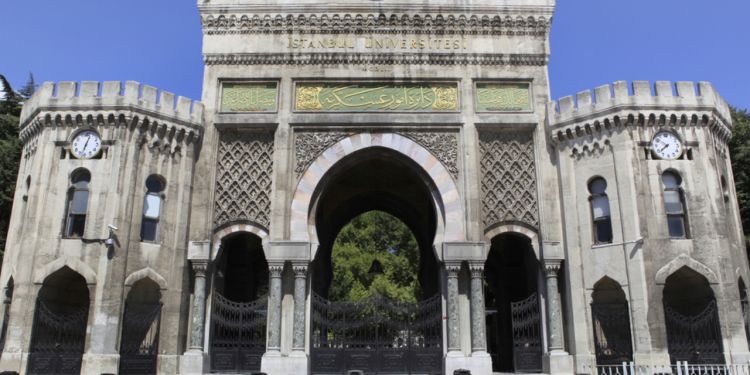
Istanbul, a city that straddles two continents, Europe and Asia, has long been a melting pot of cultures, ideas, and histories. This unique blend of Eastern and Western influences has established Istanbul as a significant educational hub, attracting students from around the globe. The city's rich historical and cultural legacy, combined with its modern and dynamic lifestyle, makes it an appealing destination for international students seeking a unique learning environment.
Why study in Istanbul
For international students, Istanbul offers more than just varied academic options. It's a truly unique city where history is palpable at every corner - from the ancient walls of Constantinople to the majestic Ottoman palaces.
Students here get the one-of-a-kind opportunity to live and learn in a place that has been a capital for Roman, Byzantine, and Ottoman empires, a city that is as much a museum as it is a vibrant, living metropolis.
The appeal also lies in the city's cosmopolitan nature. Istanbul is a city where the East meets the West, creating a dynamic and diverse cultural scene. The food, the music, the art – everything reflects a blend of Asian and European influences. For students, this means exposure to a variety of perspectives and lifestyles, an invaluable experience in today's globalized world.
Additionally, Istanbul's strategic geographic location makes it an excellent base for exploring not only Türkiye but also other countries in Europe and Asia. This aspect is particularly appealing to students who plan to combine their studies with travel and cultural exploration.
Higher education in Istanbul
Istanbul is home to a mix of public and private institutions, each offering a variety of undergraduate, graduate, and doctoral programs.
Public universities in Istanbul, like Istanbul University and Bogazici University, are state-funded and are among the oldest and most prestigious in the country. They offer a wide range of programs across various fields and are known for their rigorous academic standards. The medium of instruction can vary; while many programs are taught in Turkish, an increasing number of courses and programs are now offered in English to cater to the international student community.
Private universities, also known as foundation universities, like Koc University and Sabanci University, are known for their modern campuses, smaller class sizes, and focus on research and innovation. These institutions often have strong international connections, offering dual degree programs and exchange opportunities with universities worldwide. English is predominantly the medium of instruction in these universities, making them a popular choice among expatriate students.
For younger expatriates, Istanbul offers a considerable number of international schools that provide education in different languages, predominantly English. These schools follow various international curricula, such as the International Baccalaureate (IB), British GCSE, or the American high school system, catering to the diverse needs of the expatriate community. They are ideal for families who prefer continuity in their children's education as per international standards.
The most prominent universities in Istanbul
Istanbul is home to over 170 universities and higher education establishments. The most prominent institutions in the city include the following:
Istanbul University
Established in 1453, Istanbul University is one of the oldest educational institutions in Türkiye. Known for its diverse range of programs, it offers strong disciplines in the humanities, sciences, and law. The university provides several undergraduate programs in English (faculties of Business Administration, Economics, and Political Science) as well as graduate programs (Science, Engineering, and Social Sciences). Additionally, there are courses in the field of law offered in English.
Yearly tuition fees range from 20,000 to 150,000 Turkish Lira (around USD 640- USD 4,800), depending on the program.
Good to know:
Istanbul University conducts various short-term courses and summer schools in English. These programs often focus on Turkish culture, history, and language, providing a blend of academic learning and cultural experience.
Boğaziçi University
Recognized for its high academic standards, Boğaziçi University is situated on the scenic shores of the Bosphorus. It is renowned for its engineering, social sciences, and arts programs, with most courses conducted in English. The university's liberal arts approach and vibrant campus life make it a top choice for many students.
Tuition fees for foreign students start at 45,000 Turkish Lira (around USD 1,460) per semester.
Koç University
Established in 1993, Koç University has quickly risen to prominence for its research-oriented approach. This private university offers a wide array of programs in sciences, engineering, business, and the social sciences. Known for its modern campus and state-of-the-art facilities, it provides an English-medium education.
Tuition fees for international students start at 662,000 Turkish Lira (around USD 21,500) per year.
Sabancı University
Sabancı University is known for its innovative and interdisciplinary education model. The university excels in material science, social policy, and computer sciences, among others. Its focus on research and development, along with a strong emphasis on student-centered learning, sets it apart.
Tuition fees for foreign students also start at 662,000 Turkish Lira (USD 21,500) per year — with scholarship options available for applicants from certain countries.
Marmara University
One of the largest universities in Türkiye, Marmara University is known for its comprehensive range of faculties, including business, engineering, arts, and health sciences. The university prides itself on its multicultural and multilingual education, offering programs in various languages.
Tuition fees for international students start at 154,000 Turkish Lira per year (around USD 5,000)
Yeditepe University
A private university founded in 1996, Yeditepe University stands out for its commitment to international standards of higher education. The university offers a wide range of undergraduate and graduate programs, with a particular emphasis on international relations, business, and dentistry.
Tuition fees for international students for graduate programs start at 130,000 Turkish Lira (around USD 4,500).
Istanbul Technical University (ITU)
As one of the world's oldest technical universities, Istanbul Technical University (ITU) is celebrated for its engineering and architecture programs. The university combines a long history of academic excellence with a focus on innovative research in science and technology. The university does offer a variety of programs in English, particularly at the graduate level, to cater to its diverse and international student body.
Tuition fees for international students start at 20,537 Turkish Lira (around USD 650) per year.
Bilgi University
Established in 1996, Bilgi University is known for its liberal arts approach and diverse academic offerings, including communications, law, and performing arts. The university emphasizes critical thinking and creative problem-solving in its teaching methods.
Tuition fees for international students start at 9,720 Turkish Lira (around USD 315) per semester.
How to apply to a university in Türkiye
The first thing you should know when applying to a university in Istanbul (or elsewhere in Türkiye) is that the Turkish government establishes fixed annual quotas for the number of international students for major university programs. It is best to check with your selected university about these quotas so that you can realistically evaluate your chances against the competition.
Each university or program may have specific eligibility criteria, such as prior educational qualifications, grade requirements, and language proficiency.
For undergraduate programs, high school diplomas or equivalent qualifications are typically required. For graduate programs, a relevant bachelor's degree is usually necessary.
Check if your current qualifications are recognized by the Turkish higher education system. Some international qualifications may require equivalence certification from the Turkish Council of Higher Education (YÖK) You can find all the details of the application process as well as the list of required documents here .
If the program is taught in English, non-native speakers may need to provide proof of English language proficiency through tests like TOEFL or IELTS. Each institution and program may have its own minimum score requirements.
For programs taught in Turkish, proficiency in the Turkish language might be necessary. Universities often require a pass in the Turkish Proficiency Test (TÖMER).
Once you've selected your university and program and checked your eligibility, you will need to prepare your application documents. These generally include the following:
- Academic documents such as transcripts, diplomas, certificates, and letters of recommendation.
- A statement of purpose or a personal essay may be required, outlining your academic interests, career goals, and reasons for choosing the specific program.
- Passport-size photographs and a valid passport copy are generally required for international applicants.
Some universities might require entrance examinations, especially for competitive programs. These could include general aptitude tests or subject-specific exams.
Information about these exams, including how to register, dates, and preparation materials, is usually available on the university's website.
Applications are typically submitted online through the university's application portal. Ensure that all sections are completed accurately and all required documents are uploaded.
Pay attention to application deadlines. Some universities may have different deadlines for international students.
After you've submitted your application, you will be able to keep track of its status through the university's application portal or via email. Note that some programs may require an interview as part of the application process. These could be conducted in person or online.
Once accepted, you'll receive a letter of offer. Carefully review the offer and confirm your acceptance before the specified deadline. After acceptance, proceed with enrollment formalities, which may include paying a tuition deposit, submitting additional documents, and registering for classes.
How to apply for a student visa in Türkiye
Before applying for a student visa in Türkiye, you must be accepted into a Turkish university (or another higher education establishment). Here is a checklist of steps to follow to obtain a student visa:
- Secure your admission and obtain an official acceptance letter. This letter is a crucial document and will be required for your visa application.
- Visit the official website of the Turkish Ministry of Foreign Affairs or the nearest Turkish embassy or consulate to understand the specific visa requirements for your country. Note that each country may have slightly different requirements and procedures.
- Go on to gather the needed documents. This typically includes:
- Passport, which must be valid for at least 60 days beyond the duration of the requested visa;
- Completed visa application form, which can be obtained from the Turkish embassy/consulate's website or office;
- Recent passport-sized photographs that meet the specified criteria;
- Acceptance letter from the Turkish educational institution.
- Evidence that you can financially support yourself during your studies. These can be bank statements, scholarship letters, or financial guarantees from your parents.
- Travel insurance, valid for the duration of your stay in Türkiye;
- Details of where you will be staying in Istanbul;
- Health certificate indicating you are free from certain infectious diseases (may be requested by some embassies);
- Visa fee.
Once you've collected all the necessary documents, you can submit your application to the Turkish embassy or consulate in your home country. It's advisable to apply well in advance of your intended travel date, as processing times can vary.
Note that some applicants may be required to attend an interview. During the interview, be prepared to discuss your study plans, financial means, and ties to your home country.
After submission, your visa application will be processed. The processing time can vary depending on the embassy and the time of year. Once your visa is approved, you will be notified to collect your passport with the visa.
After arriving in Türkiye with your student visa, you must apply for a residence permit within the first month of your arrival. This can be done at the local Provincial Directorate of Migration Management. The residence permit will be valid for the duration of your study program.
And that's it. Your exciting student life in Istanbul can now begin.
Useful links:
We do our best to provide accurate and up to date information. However, if you have noticed any inaccuracies in this article, please let us know in the comments section below.








